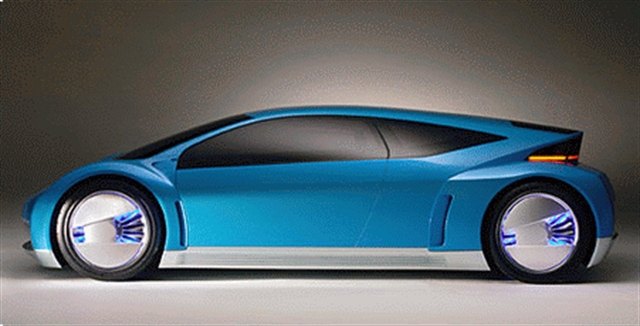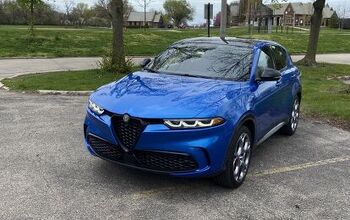Toyota: $50k Hydrogen Sedan By 2015
Lithium-ion batteries aren’t the only automotive cleantech that appears to be getting cheaper. Toyota’s head of advanced autos, Yoshihiko Masuda, tells Bloomberg that the Japanese automaker has cut the cost of hydrogen fuel cell vehicles (FCVs) by 90 percent in the last five years or so. Mid-decade, Toyota’s per-car estimates for FCVs ran near a million dollars per car. With costs now closer to the $100k mark, Toyota says it plans to cut that number in half by 2015. If they can make that happen, Masuda says, a $50k hydrogen FCV will be on like Donkey Kong.
small, but with some support
And before we scoff too hard at this damning with faint praise, let’s consider that the same could probably have been said of Toyota’s Mk.1 Prius prior to launch… and look how that turned out. Other signs that Toyota is trying to pull off another iteration of the Prius phenomenon lies in the fact that, like the Prius, Toyota doesn’t expect to make any money on the vehicle initially. According to Masuda,
Our target is, we don’t lose money with introduction of the vehicle. Production cost should be covered within the price of the vehicle.
So, no profit, but no big subsidies either… too bad Toyota won’t talk volume targets. And though range will be equivalent to a gas-powered car, the lack of hydrogen refueling stations isn’t promising. On the other hand, a retail-available FCV might be a good step towards improving demand for hydrogen fueling infrastructure. Still, GM has said that it wouldn’t consider marketing a retail FCV until there are at least 40 fueling stations in Southern California, or about four times the current number.
And there’s another problem. Though Toyota has brought down costs thanks to reduced platinum content and cheaper production of fuel cell films, there’s still a real question of what you can expect for your $50k. As in, how long can you expect your $50k FCV to last? According to Masuda:
Our target is at least 100,000 miles, 10 years
That’s not a lot of driving for 50 large. And without proven sources of low-carbon hydrogen in many markets, the environmental benefits aren’t likely to be much of an improvement over, say, the Prius. On the other hand, without gambles like these, we wouldn’t have a Prius for comparison. So is Toyota ahead of the curve the way it was with the Prius, or is the hybrid leader losing the plot? As a longtime EV skeptic, Toyota probably likes its chances… but it probably knows this won’t be easy either.
More by Edward Niedermeyer
Latest Car Reviews
Read moreLatest Product Reviews
Read moreRecent Comments
- Redapple2 Good luck to them. They used to make great cars. 510. 240Z, Sentra SE-R. Maxima. Frontier.
- Joe65688619 Under Ghosn they went through the same short-term bottom-line thinking that GM did in the 80s/90s, and they have not recovered say, to their heyday in the 50s and 60s in terms of market share and innovation. Poor design decisions (a CVT in their front-wheel drive "4-Door Sports Car", model overlap in a poorly performing segment (they never needed the Altima AND the Maxima...what they needed was one vehicle with different drivetrain, including hybrid, to compete with the Accord/Camry, and decontenting their vehicles: My 2012 QX56 (I know, not a Nissan, but the same holds for the Armada) had power rear windows in the cargo area that could vent, a glass hatch on the back door that could be opened separate from the whole liftgate (in such a tall vehicle, kinda essential if you have it in a garage and want to load the trunk without having to open the garage door to make room for the lift gate), a nice driver's side folding armrest, and a few other quality-of-life details absent from my 2018 QX80. In a competitive market this attention to detai is can be the differentiator that sell cars. Now they are caught in the middle of the market, competing more with Hyundai and Kia and selling discounted vehicles near the same price points, but losing money on them. They invested also invested a lot in niche platforms. The Leaf was one of the first full EVs, but never really evolved. They misjudged the market - luxury EVs are selling, small budget models not so much. Variable compression engines offering little in terms of real-world power or tech, let a lot of complexity that is leading to higher failure rates. Aside from the Z and GT-R (low volume models), not much forced induction (whether your a fan or not, look at what Honda did with the CR-V and Acura RDX - same chassis, slap a turbo on it, make it nicer inside, and now you can sell it as a semi-premium brand with higher markup). That said, I do believe they retain the technical and engineering capability to do far better. About time management realized they need to make smarter investments and understand their markets better.
- Kwik_Shift_Pro4X Off-road fluff on vehicles that should not be off road needs to die.
- Kwik_Shift_Pro4X Saw this posted on social media; “Just bought a 2023 Tundra with the 14" screen. Let my son borrow it for the afternoon, he connected his phone to listen to his iTunes.The next day my insurance company raised my rates and added my son to my policy. The email said that a private company showed that my son drove the vehicle. He already had his own vehicle that he was insuring.My insurance company demanded he give all his insurance info and some private info for proof. He declined for privacy reasons and my insurance cancelled my policy.These new vehicles with their tech are on condition that we give up our privacy to enter their world. It's not worth it people.”
- TheEndlessEnigma Poor planning here, dropping a Vinfast dealer in Pensacola FL is just not going to work. I love Pensacola and that part of the Gulf Coast, but that area is by no means an EV adoption demographic.


































Comments
Join the conversation
What? You don't have liquid hydrogen at this filling station? Do you know of one? And lets face it, the final vehicle if ever built will NEVER look this cool. Finally, H2 dirty little secret. The cheapest most energy efficient way to create H2 is by cracking natural gas, that comes from oil wells, from the oil industry, and requires energy to create. D'oh!
Both Honda & GM who are both fairly invested into hydrogen fuel cells predicted they would be appearing in households long before automobiles. I think they may be the future(in autos) but only after battery electrics have had a good run.